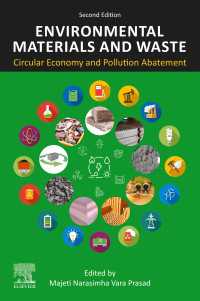Full Description
Matters of Belonging foregrounds critical practices within ethnographic museums in relation to their diverse stakeholders, with a special focus on collaboration with artists and differently constituted, self-identified communities. The book emerges from the EU-funded project SWICH (Sharing a World of Inclusion, Creativity and Heritage) that places ethnographic museums at the centre of ongoing debates about Europe's shifting polity and questions around heritage, citizenship and belonging. Addressing diverse political climates and citizenship regimes, legal frameworks and colonial/migratory histories, the articles seek to question the role of ethnographic and world cultures museums within contemporary negotiations of how to define Europe, Europeans, and European heritage, especially mindful of the region's colonial and migratory pasts.
The book is neither celebratory nor congratulatory, and does not depict a triumphal overcoming by ethnographic museums of their troubled pasts. Its aim is to think critically about these museums' responses, to identify both pitfalls and positive developments, and to sketch out possible futures for museums generally, and ethnographic museums specifically, as they try to locate themselves within discussions about Europe and its futures.
Core to the book's argument is that it may exactly be in their entanglement with the colonial past that these museums can become important sites for thinking about colonial entailments in the present. Facing up to this past is the beginning of addressing these larger legacies. The authors suggest that the ethnographic museum has been the site not just for trenchant questioning of colonial durabilities in contemporary Europe, but also for the development of new practices - of collaboration and authority-sharing, of recognition and belonging. The book explores these models, not as complete, but as a starting point to push forward new practices.
Contents
Acknowledgements
List of images
Introduction
Wayne Modest
Heritage
The Museum Inside-out - Twenty Observations
Nicholas Thomas
Museums and Source Communities: Reflections and implications
Laura Peers
Our House is Made of Thin, Burning Ice. Let's Dance
Sandra Ferracuti
On Collaboration - the Making of the Afterlives of Slavery exhibition at the Tropenmuseum
Rita Ouédraogo, Robin Lelijveld, Wayne Modest
Creativity
Questions of Belonging
Alana Jelinek
Love and Loss in the Ethnographic Museum
Rajkamal Kahlon
Eyes in the Back of Your Head
Bianca Baldi
I came as a Stranger
Aleksandra Pawloff
The Long Walk: Following the Tick Ticking Sounds into the Unknown - Or the Omitted
Jacqueline Hoàng Nguyễn
Inclusion
Shared Authority Matters: Collaboration with Heritage Bearers with Migrant Background
Tina Palaić and Bojana Rogelj Škafar
Uncomfortable Memory and Community Participation at the Barcelona Ethnological and World Cultures Museum
Salvador García Arnillas and Lluís-Josep Ramoneda Aigüadé
The Making of a Point of View: A Participatory Exhibition at the Pigorini Museum in Rome
Rosa Anna Di Lella - Loretta Paderni
Out of Boxes: Touching Wor(l)ds, Moving Pictures
Urban Nomad Mixes







